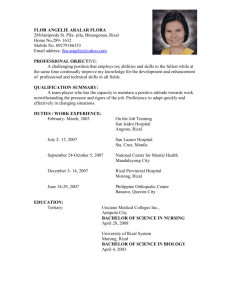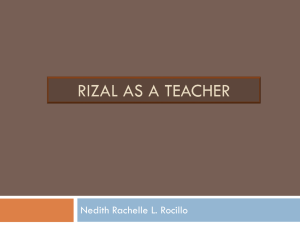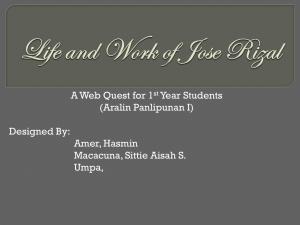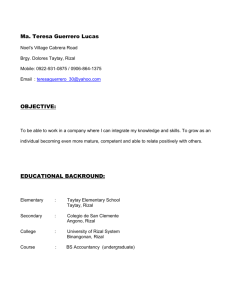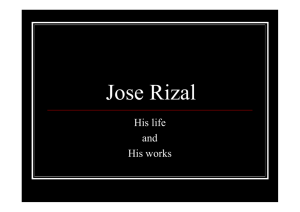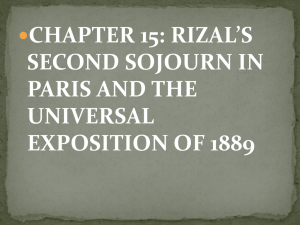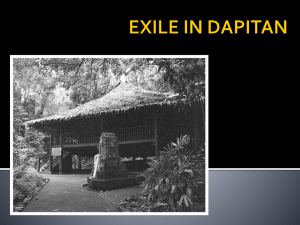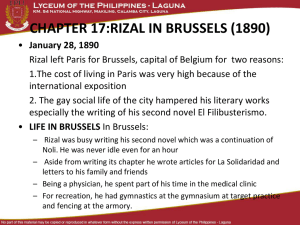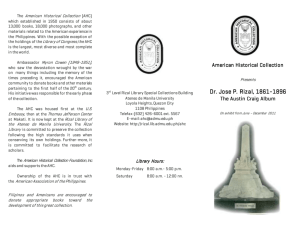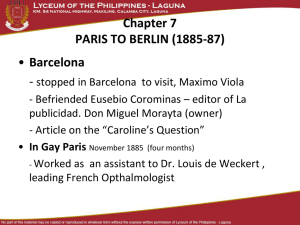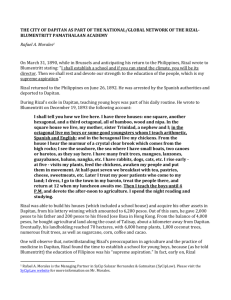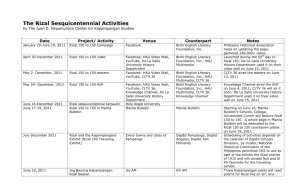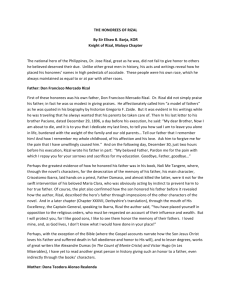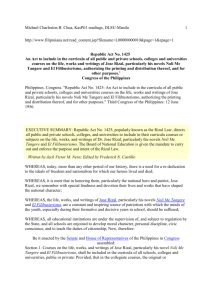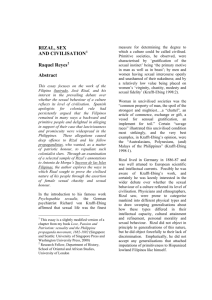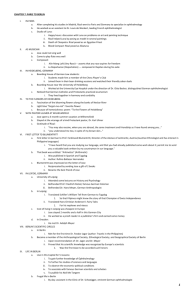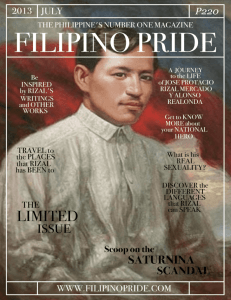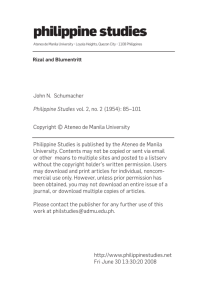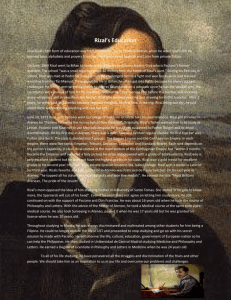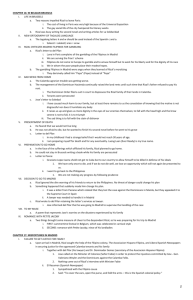here - WordPress.com
advertisement
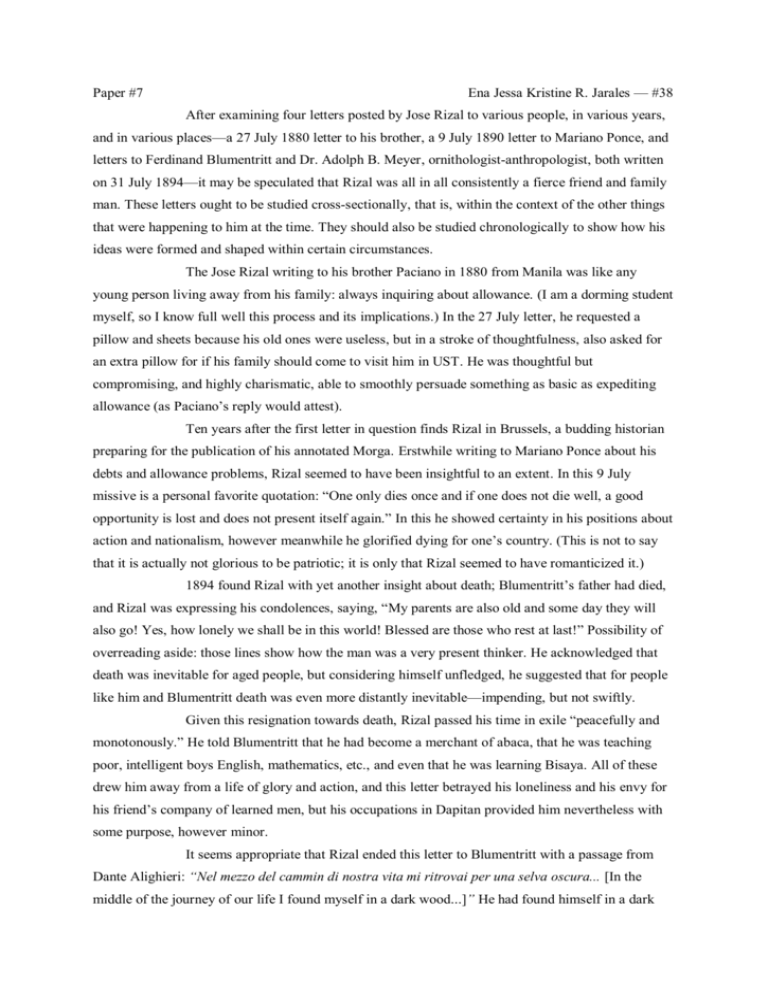
Ena Jessa Kristine R. Jarales — #38 Paper #7 After examining four letters posted by Jose Rizal to various people, in various years, and in various places—a 27 July 1880 letter to his brother, a 9 July 1890 letter to Mariano Ponce, and letters to Ferdinand Blumentritt and Dr. Adolph B. Meyer, ornithologist-anthropologist, both written on 31 July 1894—it may be speculated that Rizal was all in all consistently a fierce friend and family man. These letters ought to be studied cross-sectionally, that is, within the context of the other things that were happening to him at the time. They should also be studied chronologically to show how his ideas were formed and shaped within certain circumstances. The Jose Rizal writing to his brother Paciano in 1880 from Manila was like any young person living away from his family: always inquiring about allowance. (I am a dorming student myself, so I know full well this process and its implications.) In the 27 July letter, he requested a pillow and sheets because his old ones were useless, but in a stroke of thoughtfulness, also asked for an extra pillow for if his family should come to visit him in UST. He was thoughtful but compromising, and highly charismatic, able to smoothly persuade something as basic as expediting allowance (as Paciano’s reply would attest). Ten years after the first letter in question finds Rizal in Brussels, a budding historian preparing for the publication of his annotated Morga. Erstwhile writing to Mariano Ponce about his debts and allowance problems, Rizal seemed to have been insightful to an extent. In this 9 July missive is a personal favorite quotation: “One only dies once and if one does not die well, a good opportunity is lost and does not present itself again.” In this he showed certainty in his positions about action and nationalism, however meanwhile he glorified dying for one’s country. (This is not to say that it is actually not glorious to be patriotic; it is only that Rizal seemed to have romanticized it.) 1894 found Rizal with yet another insight about death; Blumentritt’s father had died, and Rizal was expressing his condolences, saying, “My parents are also old and some day they will also go! Yes, how lonely we shall be in this world! Blessed are those who rest at last!” Possibility of overreading aside: those lines show how the man was a very present thinker. He acknowledged that death was inevitable for aged people, but considering himself unfledged, he suggested that for people like him and Blumentritt death was even more distantly inevitable—impending, but not swiftly. Given this resignation towards death, Rizal passed his time in exile “peacefully and monotonously.” He told Blumentritt that he had become a merchant of abaca, that he was teaching poor, intelligent boys English, mathematics, etc., and even that he was learning Bisaya. All of these drew him away from a life of glory and action, and this letter betrayed his loneliness and his envy for his friend’s company of learned men, but his occupations in Dapitan provided him nevertheless with some purpose, however minor. It seems appropriate that Rizal ended this letter to Blumentritt with a passage from Dante Alighieri: “Nel mezzo del cammin di nostra vita mi ritrovai per una selva oscura... [In the middle of the journey of our life I found myself in a dark wood...]” He had found himself in a dark wood, but smart man that he was, he still managed to not trip over any of the trees and to even enjoy himself a bit while trying to grope his way out. At this point it may be inferred that Jose Rizal was a compassionate, affectionate, resourceful man, and that he frequently rationalized his reasons for being so: he was a rational thinker that way. One thing to note, however, is that it is easy to say that Rizal probably controlled the tone and contents of his letters, depending on whom he wrote—but it is ridiculous to think that even then Rizal already categorized his letters according to ‘Letters to Blumentritt’, ‘Miscellaneous Letters,’ and so on. Hence what should be gleaned from any study of his correspondences should not, in my opinion, only provide a definitive picture of what Rizal was like, but more importantly show crosssectionally and chronologically the complexity and growth of his character. Obviously, Rizal’s growth showed through the gradual changes in the way he wrote his letters: his letters to Blumentritt and Dr. Meyer on the same date two years before he died hinted at a sense of urgency. To be sure, in 1894 he was anxious to be released from exile in Dapitan, and his trivial worries then and the little things he hoped to accomplish in what he thought was the future— craniometric studies, diminishing linguistic capabilities, mathematics in French, bamboo cases of unidentified purpose—reveal an optimism that I from retrospect found very sad. It was like watching a movie adaptation but having read the book beforehand, the moviegoer already knows that the main character was going to die. Rizal definitely knew that eventually the struggle for independence would cost him his life, but it was depressing for me to see how he probably thought it would not be for a few years more and to see that his words still held so much promise. In 1894, he still promised Dr. Meyer one of those bamboo cases, still hoped to publish his dictionary on Tagalog grammar, still planned to live a few weeks among the Subanos, the mountaineers, and the Moros to study their cultures. There are many things we learn from Rizal and the things he did, but one of the more sentimental things we learn is the difference made by one’s knowing when a person will die and that person living blissfully unaware.
